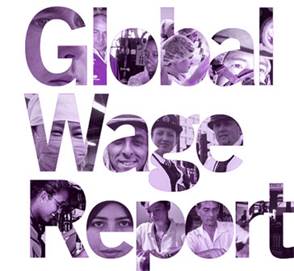Description

Disclaimer: Copyright infringement not intended.
Context
- The Global Wage Report 2022-23 on the impact of COVID-19 and inflation on wages and purchasing power, prepared by the ILO, was released in Geneva.
Findings
Effect of War and Global energy crisis
- Inflation and a global slowdown in economic growth due to the war in Ukraine and Global energy crisis are causing a “striking fall” in real monthly wages in many countries, says a report by the International Labour Organisation (ILO).
Wages in India
- In India too, the wages have come down from the pre-pandemic conditions, according to the data provided in the report. The crisis was also reducing the purchasing power of the middle classes and hitting low-income households particularly hard.
- Average real wage index for India, in the category of emerging G20 economy, saw a decrease soon after the pandemic.
Emerging G-20 Economies
- Among the emerging G20 economies, China continues to dominate the ranking in real wage growth, with estimates showing that monthly wages there in 2022 were about 2.6 times their real value in 2008.
- Except for Mexico, in 2022 all emerging G20 economies exhibit average monthly wages that are higher in real terms than the baseline (2008).
- Despite more rapid wage growth among emerging G20 economies, there was still a significant gap between their average level of real wages and that of advanced G20 economies.
- Conversion of all the G20 countries’ average wages into US dollars using exchange rates based on purchasing power parity yields a simple average wage of about US$ 4,000 per month in the advanced economies and about US$ 1,800 per month in the emerging economies.
Global Monthly Wages
- The ILO estimated that global monthly wages fell in real terms to minus 0.9% in the first half of 2022. The United Nations body noted that it was for the first time in this century that real global wage growth has been negative.
Advanced G-20 Countries
- Among advanced G20 countries, real wages in the first half of 2022 are estimated to have declined to minus 2.2%, whereas real wages in emerging G20 countries grew by 0.8%, 2.6% less than in 2019, the year before the COVID-19 pandemic.
.jpg)
Causes and Implications
- Inflation was the major reason for decrease in income and the greatest impact was on low-income groups.
- Rising inflation had a greater cost-of-living impact on lower-income earners, the ILO said adding that they had to spend most of their disposable income on essential goods and services, which generally experience greater price increases than non-essential items.
- Inflation is also biting into the purchasing power of minimum wages.
- Income inequality and poverty will rise if the purchasing power of the lowest paid is not maintained. In addition, a much-needed post-pandemic recovery could be put at risk. This could fuel further social unrest across the world and undermine the goal of achieving prosperity and peace for all.
- Although the recent health crisis and the war in Ukraine seem to be the key drivers of uncertainty at present, the fact is that over the past two decades the world has arguably been drifting in a direction that endangers the prospect of achieving prosperity and peace for all, as called for by the United Nations 2030 Agenda for Sustainable Development.
About ILO
- The International Labour Organization (ILO) is a United Nations agency whose mandate is to advance social and economic justice through setting international labour standards.
- It was created in 1919, as part of the Treaty of Versailles that ended World War I, to reflect the belief that universal and lasting peace can be accomplished only if it is based on social justice.
- It is the first and oldest specialised agency of the UN.
- The Organization has played a role at key historical junctures – the Great Depression, decolonization, the creation of Solidarność in Poland, the victory over apartheid in South Africa – and today in the building of an ethical and productive framework for fair globalization.
- The ILO has 187 member states: 186 out of 193 UN member states plus the Cook Islands.
- The driving forces for the ILO's creation arose from security, humanitarian, political and economic considerations.
- It is the only tripartite U.N. agency. It brings together governments, employers and workers of 187 member States, to set labour standards, develop policies and devise programmes promoting decent work for all women and men. Its headquarters are in Geneva, Switzerland.
- With its focus on international development, it is a member of the United Nations Development Group, a coalition of UN organization aimed at helping meet the Sustainable Development Goals.
ILO Publications
- Global Wage Report
- Social Dialogue Report
- World Employment and Social Outlook
- World Social Protection Report
.jpg)
https://www.thehindu.com/news/national/striking-fall-in-wages-could-lead-to-social-unrest-warns-international-labour-organisation/article66210844.ece






.jpg)







